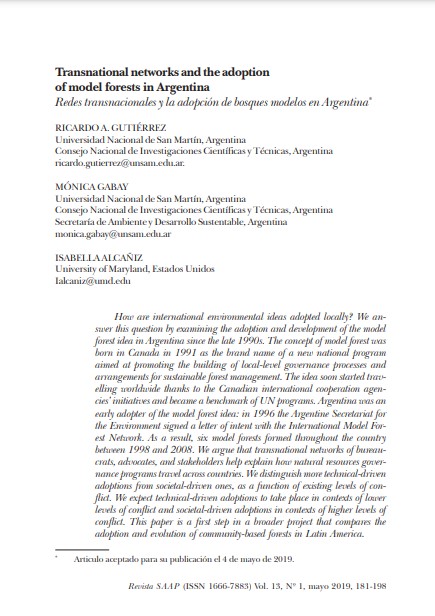Transnational networks and the adoption of model forests in Argentina
Bosque Modelo:
Norte de Neuquén
Temática:
Gestión forestal
Tipo de documento:
Artículo científico
Resumen
How are international environmental ideas adopted locally? We answer this question by examining the adoption and development of the model
forest idea in Argentina since the late 1990s. The concept of model forest was
born in Canada in 1991 as the brand name of a new national program
aimed at promoting the building of local-level governance processes and
arrangements for sustainable forest management. The idea soon started travelling worldwide thanks to the Canadian international cooperation agencies’ initiatives and became a benchmark of UN programs. Argentina was an
early adopter of the model forest idea: in 1996 the Argentine Secretariat for
the Environment signed a letter of intent with the International Model Forest Network. As a result, six model forests formed throughout the country
between 1998 and 2008. We argue that transnational networks of bureaucrats, advocates, and stakeholders help explain how natural resources governance programs travel across countries. We distinguish more technical-driven
adoptions from societal-driven ones, as a function of existing levels of conflict. We expect technical-driven adoptions to take place in contexts of lower
levels of conflict and societal-driven adoptions in contexts of higher levels of
conflict. This paper is a first step in a broader project that compares the
adoption and evolution of community-based forests in Latin America.
Información Bibliográfica
Autor:
Ricardo Alberto Gutiérrez, Mónica Gabay, Isabella Alcañiz
Revista:
Sociedad Argentina de Análisis Político
Año:
2019
N°:
1
País :
Argentina
Páginas:
181 - 198
Volumen:
13
Idioma:
Ingles
Palabras claves
Model Forest, environmental, Argentina





